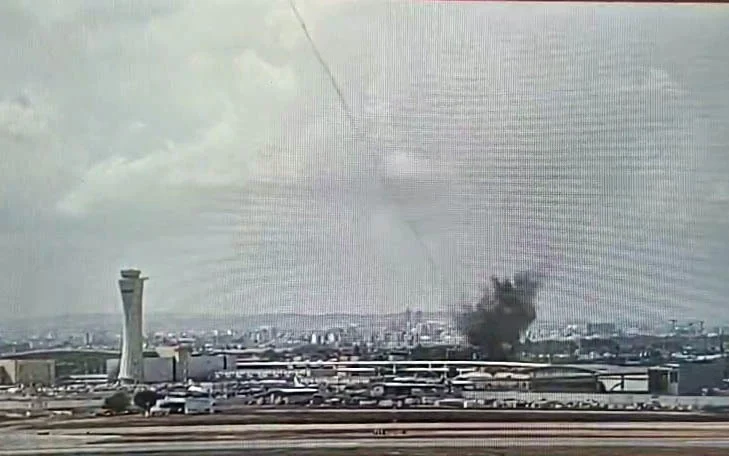Screen grab from CCTV footage shows impact of ballistic missile near Ben Gurion Airport on May 4, 2025 (Screen grab from social media used in accordance with Clause 27a of the Copyright Law)
A ballistic missile fired by the Iran-backed Houthis in Yemen impacted on the grounds of Ben Gurion Airport on Sunday morning, injuring six people, none of them seriously. The blast occurred in a grove of trees alongside an access road close to the airport’s main Terminal 3, several hundred yards from the airport control tower.
The military said it made several attempts to intercept the missile but failed to shoot down the projectile. “An impact was identified in the area of Ben Gurion Airport,” it said.
The attack marked the first time a Houthi missile had impacted within the grounds of the airport. A Hezbollah missile hit a parking area on the airport’s perimeter in November.
Both the Israeli Air Force’s long-range Arrow air defense system and the US’s THAAD system failed to intercept the Houthi missile, defense sources said. The Israeli Air Force’s aerial defense array was investigating the failure.
Those hurt in the attack included a man in his 50s in good-to-moderate condition with trauma to his limbs and two women, aged 54 and 38, in good condition who were hit by the shockwave, the Magen David Adom ambulance service said in a statement.
A man, 64, was lightly hurt after he was hit by an object that flew from the impact site, and two more women, aged 22 and 34, were lightly hurt while running for shelter, MDA said.
Another two people were treated for acute anxiety.
The wounded were taken to hospitals in central Israel.
Surveillance camera footage showed the moment the missile impacted in a grove adjacent to an access road, within the airport’s perimeter.
Sirens sounded across central Israel at 9:22 a.m. Preceding the sirens by some five minutes, an early warning was issued to residents, alerting civilians of the long-range missile attack via a push notification on their phones.
The new alert system, which was recently activated, has undergone teething pains of either not sending alerts or sending out warnings over a wider area than the sirens cover.
Initiating routine procedure, Ben Gurion Airport halted takeoffs and landings following the launch of the ballistic missile. It reopened its airspace about an hour after the missile hit.
Still, the German Lufthansa carrier group, which includes Lufthansa, SWISS, Austrian Airlines, and Brussels Airlines, canceled all flights Ben Gurion Airport scheduled for Sunday, according to its website.
Spanish airline Air Europa also said it was canceling flights between Tel Aviv and Madrid.
By late afternoon, most foreign airlines had suspended services.
Yemen’s Houthis claimed responsibility for the launch, the group’s military spokesperson Yahya Saree said in a televised statement.
Saree reiterated a warning to airlines that the Israeli airport was “no longer safe for air travel.”
Mohammed al-Bukhaiti, a senior Houthi official, told the Qatari Al-Araby TV channel that the rebel group had demonstrated its ability to strike sensitive targets in Israel on Sunday morning.
He added that the Iran-backed group has “no red lines” in its fight against Israel.
After the attack, Prime Minister Benjamin Netanyahu was set to hold a meeting by telephone with Defense Minister Israel Katz and other top defense officials at 3 p.m. to examine potential responses, including a direct Israeli strike on Houthi assets in Yemen.
At 7 p.m., Netanyahu will convene his security cabinet in person to discuss the expansion of the military campaign in Gaza, fighting in Syria, the Houthi attack, and more.
In a terse statement following the attack, Katz said, “Whoever harms us, we will strike them sevenfold.”
srael has avoided striking in Yemen in response to recent Houthi attacks as the United States wages a major campaign against the Iran-backed group.
Security officials told the Kan public broadcaster that “after the hit at Ben Gurion Airport, from our perspective, there are no restrictions” for a response against the Houthis.
The opposition National Unity party chairman Benny Gantz called on the government to hold Iran accountable for the attack.
“This is not Yemen, this is Iran. It is Iran that is firing ballistic missiles at the State of Israel, and it must bear responsibility,” wrote the former defense minister on X.
“The Israeli government must wake up,” he said, arguing that fire on Israel “must lead to a severe response against Tehran.”
Sunday’s attack came one day after the last launch, when a ballistic missile fired by the Houthis triggered sirens in Jerusalem and some parts of southern Israel. The IDF successfully intercepted the projectile.
Since March 18, when the IDF resumed its offensive against Hamas in the Gaza Strip, the Houthis in Yemen have launched some 27 ballistic missiles and several drones at Israel. Only around half of them triggered sirens in the country and were shot down, while the others fell short.
The sirens have sent hundreds of thousands of Israelis rushing to shelters at all hours of the night and day, causing a number of injuries in the scramble. The sirens are a precaution against falling debris from intercepts, which have occasionally caused injuries, death and damage.
The Houthis — whose slogan is “Death to America, Death to Israel, a Curse on the Jews” — began attacking Israel and maritime traffic in November 2023, a month after the October 7 Hamas attack.
In recent weeks, the United States has been carrying out massive airstrikes in Yemen against the Houthis, targeting their leadership and infrastructure.
Source: The Times of Israel
Reuters contributed to this report.


































